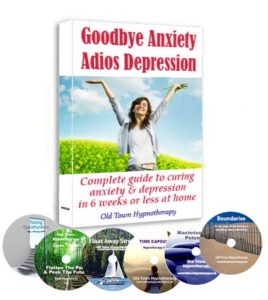If you have anxiety and/or depression you will be familiar with obsessive thinking as it is one of the characteristics of the conditions along with global thinking, self-centric thinking, negative forecasting of the future or negative introspecting of yourself, your life or the past.
These are all primitive survival strategies not appropriate for modern day life but applied nonetheless when anxiety levels rise.
If you imagine you are back in primitive times for a moment and a dangerous saber tooth tiger was prowling around outside your cave. Your primitive brain, responsible for your survival and influenced by your flight/fight response system, would kick in instantly and you would probably think something along the lines of ‘It’s going to kill and eat me’. Your rational intellectual brain would take a back seat as survival mode took over and, what’s more, you would not forget that danger lurked outside the cave. You can recognise the same characteristics of anxiety – all or nothing/worst possible scenario – it’s going to eat me, self-centric thinking and negative forecasting and it will keep reminding you that dangerous tigers are outside. Entirely appropriate for those times and that situation, but we still have this primitive flight/fight response system being applied to modern day life. Say, for example, you’re struggling to pay the mortgage one month, your brain will think in terms of worst possible scenario, it’s all about me and will negatively forecast what is going to happen.
All of these are standard symptoms and ways of thinking for people with anxiety or depression, but for some the obsessive thinking becomes extreme, usually as the anxiety is prolonged and becomes more severe, and a form of OCD (Obsessive Compulsive Disorder) develops.
OCD can be in the form of habits and actions or thoughts. Habits such as disinfecting, cleanliness, checking things, rituals, having things in order or being over obsessive about things is more commonly known, but obsessive thinking also occurs and is more difficult for family or friends to understand as there is no visual evidence of the condition.
You can identify when ‘normal’ the obsessive thinking of anxiety and depression has become an OCD because the subject of the thoughts becomes more fixated on one particular thing. For example, I have had clients who have fixated on a song they can’t get out of their head or fixated on being attacked or noises such as someone else eating a clock ticking, the sound of an engine idling or the neighbours. In fact, fixating and obsessing about noise is so common it has a name, misophonia.
OCD occurs, whether it’s a habit or thoughts, when anxiety levels are very high. As anxiety rises, the primitive brain steps in to try and help and behaves in the way described above, however, the primitive brain is not an intellect, so it doesn’t know what to do about it, all it can do is refer to previous patterns of behaviour, if you survived yesterday by doing something in particular, it will encourage you, or compel you to do the same thing again. What you do doesn’t have to have any rational or logical reasoning, you survived that’s all that matters to the primitive brain. Smoking is a good example of this, logically we all know smoking isn’t a good survival tactic, but it’s not the nicotine that promotes smoking, it’s the anxiety of it being taken away that keeps someone smoking – you did it yesterday and survived, so you must do it again. OCD habits are easier to recognise and identify with anxiety, again they don’t usually make much sense to the onlooker, but the thought of not being able to follow the ritual or habit to the person suffering with the condition increases the anxiety and the compulsion to carry out the habit.
Unfortunately the same thing occurs with an OCD thought pattern, try to NOT think about the obsession and the compulsion grows even stronger.
Try fighting an OCD and you will always lose, the same as the part of your brain responsible for flight or fight and keeping you alive is always going to be more powerful than your rational intellectual brain when your anxiety levels are high.
The answer is to bring down your anxiety levels first, learn how to burn off anxiety and adrenaline and then how to not create the anxiety in the first place.
Anxiety is created by negative forecasting of the future; worrying, however, telling you not to worry about whatever it is that’s worrying you is putting you back in the same vicious cycle, like telling you NOT to think about a pink elephant – too late, you’re already doing it.
Tricky isn’t it?
It’s no wonder so many people get trapped in the anxiety cycle, trying not to think about the thing that’s creating anxiety makes you think about it even more, trying to fight the thoughts makes you focus on them harder.
So what do you do to both bring down anxiety levels and reduce the OCD. As OCD is linked to anxiety levels, all you really have to do is learn how to reduce anxiety.
Your brain needs something else to focus on. You can only think about 5-7 things at one time with your conscious brain (give or take 2), so if you engage your brain in something it has to actively think about instead, then it cannot focus on the obsession at the same time.
The three areas to focus on are:-
Positive Activity
Positive Interaction
Positive Thinking
Activity will work wonders for both anxiety and OCD it not only burns off the Adrenalin created through anxiety, it creates serotonin, a neurotransmitter than is extremely beneficial for both anxiety and depression.
Interacting in a positive way with people you enjoy being with will distract you from worrying about things and also create serotonin and dopamine another good neurotransmitter
Positive thinking will also create serotonin and help you to focus on solutions instead of problems. Your brain loves being engaged in positive things, learning new skills and also being actively engaged in tasks, so anything that requires thinking and brain power rather than repetitive manual tasks is going to be beneficial. Hot spots for negative forecasting are when you are doing manual tasks that you don’t have to think too much about such as cleaning, ironing, driving, commuting to work. You can turn this into positive thinking by engaging your brain in something positive at the same time, for example, listening to an audio book (not radio or music).
You can develop your own strategies that distract you from thinking too much, but keep your brain occupied with positive things alongside activity and being with people.
If you a prone to anxiety, avoid being alone with too much time to think. If you live alone, find something positive for your brain to do. Activities like watching TV increase anxiety, they don’t help, so avoid it as much as possible.
If you would like to find out more about anxiety and depression and how you can cure yourself, check out the 7 Day Crash Course and Goodbye Anxiety, Adios Depression below.


